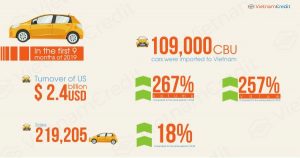Vietnam’s automobile market is growing impressively. However, it is still difficult for businesses within the industry to increase competitiveness and promote stable development.
Attractive to foreign businesses
According to a report of the General Department of Customs, in the first 9 months of 2019, more than 109,000 CBU cars were imported to Vietnam, with a turnover of US $ 2.4 billion. Compared to the same period in 2018, it has increased by 267% in volume and 257% in value.
Remarkably, below 9-seat cars took the lead in imports, with about 75,848 cars, valued at USD 1.459 billion. This shows that the purchasing power is increasing and there is a change in demand of customers. Data from the Vietnam Automobile Manufacturers Association (VAMA) also shows that the sales of its member in the first 9 months of 2019 reached 219,205 cars of all kinds, which is an increase of 18% over the same period last year. In particular, the personal car segment experienced a high growth of 30% over the same period in 2018.
The growth of sales of the market reached nearly 20% and VAMA expects that by the end of 2019 and early 2020, this figure will reach 25% with many new development potentials for the whole industry.
The reason is that it is expected that from the beginning of 2020, regulations such as batch inspection and type quality certificates will be eliminated, which will make import operation easier with reduced car prices, putting further pressure on domestically manufactured vehicles.
At Vietnam Motor Show 2019 held on 24 – 27 October in Ho Chi Minh City, Mr. Laurent Genet, Representative of the Vehicles Importers Vietnam Association (VIVA) said that in general, the market has seen a lot of changes in the domestic automobile industry over the past 9 months. There have been more progressive shifts in the policies for the industry, contributing to promoting investment in car assembly lines as well as improving import market. Retail prices of car models on the Vietnamese market have also continuously decreased.
According to Mr. Toru Kinoshita, Chairman of Vietnam Automobile Manufacturers Association: “In the future, Vietnam promises to be a potential market thanks to the stable development of the economy and the strength of the population. In order to catch up with that trend, businesses have been focusing on promoting production, improving the quality of sales and service activities, and developing agency networks to meet the diverse needs of customers”.
Mr. Tran Vinh Tuyen, Vice Chairman of Ho Chi Minh City People’s Committee, said: “It is the increasing demand of the Vietnamese people that has boosted automobile consumption with the number of cars expected to be sold in 2019 may exceed 300,000 vehicles”. In addition, according to some experts, this is the result of the special consumption tax reduction policy and ASEAN import tax decreasing to 0%, applied from the beginning of 2018. At the same time, import tax for automotive components are also reduced to 0%, accompanied by conditions of output. This is the dominant factor that has helped imported cars quickly appear in the domestic market, boosting consumption and increasing competitiveness among brands.
Tariff barriers gradually removed
At the conference on creating markets for Vietnam automobile industry, which took place on October 24 in Ho Chi Minh City, Mr. Ninh Huu Chan, General Secretary of Vietnam Automobile Manufacturers Association, said that Vietnam’s automobile market is considered potential with a large population and a limited number of individual cars.
 The potential for the development of Vietnam’s automobile industry depends on three factors, including population size and structure, per capita income and the average number of vehicles per 1,000 people. In Vietnam, the trend of automation is expected to happen in the coming time, when GDP per capita exceeds USD 3,000 and the average number of cars per 1,000 people reaches 50 vehicles.
The potential for the development of Vietnam’s automobile industry depends on three factors, including population size and structure, per capita income and the average number of vehicles per 1,000 people. In Vietnam, the trend of automation is expected to happen in the coming time, when GDP per capita exceeds USD 3,000 and the average number of cars per 1,000 people reaches 50 vehicles.
Supplies and demands are increasingly diverse. Customers will be an important factor to help businesses identify consumer tastes and preferences. To create a market for the Vietnamese automotive industry, customers are what both regulatory agencies and businesses should pay attention to during the transformation of the domestic automobile market.
Sharing the same view, Mr. Do Nam Binh, Director of the Industrial Development Center of the Department of Industry (Ministry of Industry and Trade), said that the development of the automobile industry is a positive factor promoting other related industries.
However, Vietnamese automobile manufacturers and assemblers are currently only involved in the low-added-value stages, and are not able to master the core technology, while the prices of cars are high and the localization rate is low. In addition, according to businesses, digital world will help manufacturers get closer to customers but will be a challenge as well in the context of extensive integration, when the tariff barriers are gradually removed in accordance with international commitments.
Mr. Nguyen Dang Duy Nhat, General Director of Global Elite Consulting, Director of CMO Council in Vietnam, said that Free Trade Agreements facilitate trade with the tax being reduced to 0%, which means manufacturers cannot do anything other than depend on customers to improve competitiveness and expand markets.
“In the customer-centric strategy, we need to focus on the unique values of each brand. However, this is also a problem that every business needs to find its own solution,” Nhat emphasized. Chan said that automobile manufacturers, assemblers and importers need to be aware of the importance of understanding customer needs, thereby quickly adapting. Only in that way can they make a difference in both products and services to maintain their positions on the fierce competition.
However, Mr. Chan also pointed out that taking customers as development goals is not only limited to enterprises but also related to policy development activities, and investment in technology and infrastructure system development.
Source: VietnamCredit – Vietnambiz
https://vietnamcredit.com.vn/


























